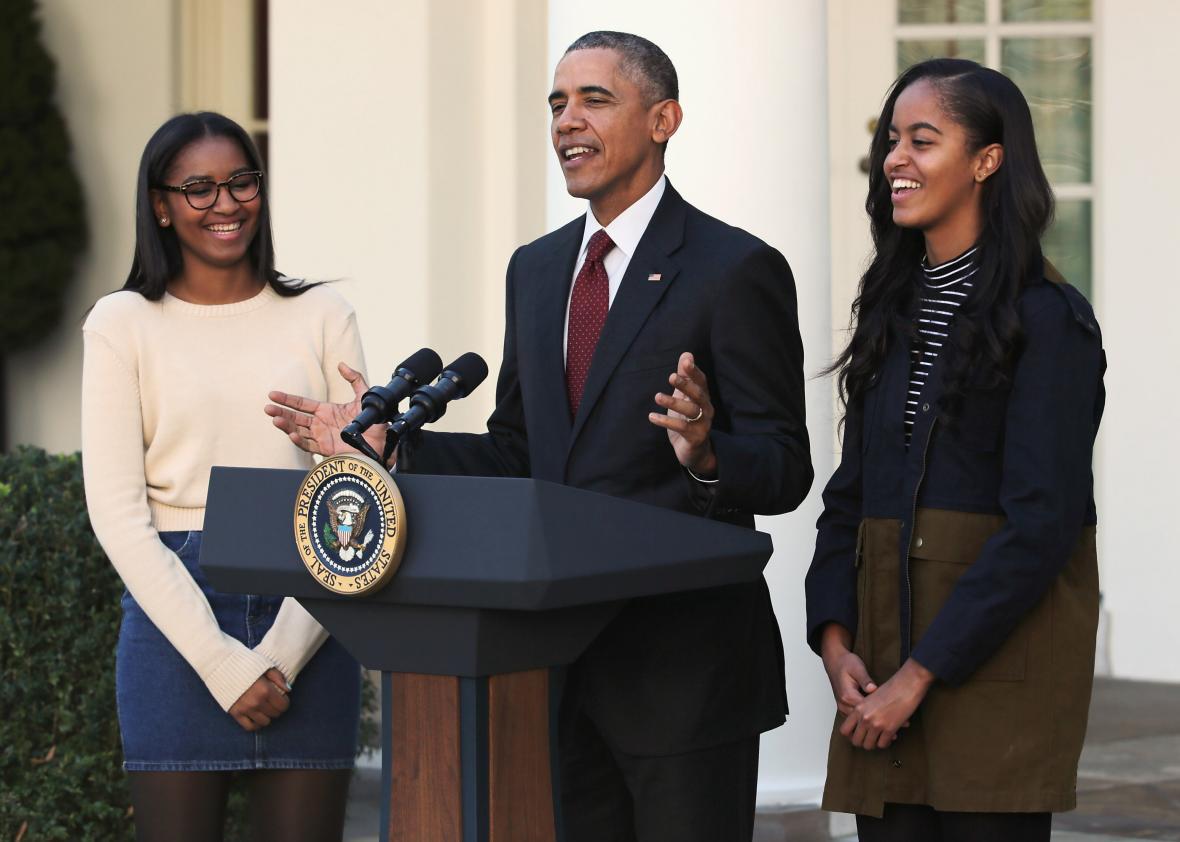In the battle of North American male-feminist heads of state, America has just one-upped Canada big time. On Thursday morning, Barack Obama published an essay about feminism in Glamour, and it does not suck.
Writing an authentic-sounding essay for a contemporary young-people’s publication isn’t easy for a political leader. (See: Hillary Clinton’s weird Billboard essay on women in pop music.) Any essay about feminism with a male byline has to reach an even higher standard of credibility. To make his editorial work (and, for the most part, he does), Obama hits a few guaranteed crowd-pleasers. He quotes Congresswoman Shirley Chisholm, the first black person and first woman to seek the presidential nomination of a major party, who said, “The emotional, sexual, and psychological stereotyping of females begins when the doctor says, ‘It’s a girl.’” He admits that managing his double career as a state senator and law professor made it hard for him to be an equal parent when Malia and Sasha were little. “I can look back now and see that, while I helped out, it was usually on my schedule and on my terms,” he writes. “The burden disproportionately and unfairly fell on Michelle.”
As president, he writes, the best “unexpected gift” of the job has been his nonexistent commute, which gives him more time to spend with his daughters. He says having daughters has made him more aware of the insidious workings of the patriarchy—a truth, however troubling, probably shared my many fathers. Obama continues:
One thing that makes me optimistic for them is that this is an extraordinary time to be a woman. The progress we’ve made in the past 100 years, 50 years, and, yes, even the past eight years has made life significantly better for my daughters than it was for my grandmothers. And I say that not just as President but also as a feminist. … It’s important that their dad is a feminist, because now that’s what they expect of all men.
Perhaps under pressure from Canadian Prime Minister Justin Trudeau, who’s made women half his cabinet and spoken at length about feminism, Obama has begun making stronger-than-ever statements about gender equality over the past few months. “I may be a little grayer than I was eight years ago, but this is what a feminist looks like,” he said in a June address at the White House’s first United State of Women summit. It’s not hard to imagine Michelle sipping some tea, reading the Ottawa Citizen at breakfast, and making some offhand remark like “Oh, wow, Justin Trudeau gave another totally woke statement about feminism. What a great leader. Barack, pass the scones?” Maybe Sasha has deliberately left a few Rookie tabs open on her dad’s work computer every now and then. Or perhaps Malia’s been forwarding him BFF Lena Dunham’s Lenny e-newsletter with just one line of text: “FYI.”
Whatever the Obama women are doing now, it’s working—the president has occasionally run afoul of feminist best practices in the past. He called California’s Kamala Harris “by far the best looking attorney general” in 2013. When he spoke to Time earlier this year about body-image concerns and looks-based pressures women face, he said of his daughters, “the fact that they’ve got a tall gorgeous mom who has some curves, and that their father appreciates, I think is helpful.” That statement falls under the category of “seemingly benevolent remarks that reinforce sexist structures of power”: Body confidence is not something a man can give a woman, and harmful cultural beauty norms don’t all stem from the male gaze.
What’s completely refreshing about Obama’s Glamour essay is his eventual focus on the real problem underlying gender inequality: men. “While I’ll keep working on good policies—from equal pay for equal work to protecting reproductive rights—there are some changes that have nothing to do with passing new laws,” he writes. “In fact, the most important change may be the toughest of all—and that’s changing ourselves.” Obama lays out a series of bad attitudes that bias societies against women:
Growing up without a dad, I spent a lot of time trying to figure out who I was, how the world perceived me, and what kind of man I wanted to be. It’s easy to absorb all kinds of messages from society about masculinity and come to believe that there’s a right way and a wrong way to be a man. But as I got older, I realized that my ideas about being a tough guy or cool guy just weren’t me. They were a manifestation of my youth and insecurity. … We need to keep changing the attitude that raises our girls to be demure and our boys to be assertive, that criticizes our daughters for speaking out and our sons for shedding a tear. We need to keep changing the attitude that punishes women for their sexuality and rewards men for theirs. … We need to keep changing the attitude that teaches men to feel threatened by the presence and success of women. We need to keep changing the attitude that congratulates men for changing a diaper, stigmatizes full-time dads, and penalizes working mothers.
This is all true, and frankly remarkable to read under the byline of the president. (Can you picture either George Bush writing this kind of thing? Bill Clinton? Donald Trump?) But it’s hard to make out Obama’s target audience. He engages in an awkward see-saw between writing about women as a third party and addressing the presumably all-woman readership of Glamour directly. “I’ve witnessed how women have won the freedom to make your own choices about how you’ll live your lives—about your bodies, your educations, your careers, your finances,” he writes. Women know that men need to change. So does Barack Obama. Do other men? Next time, Obama should publish his feminist manifesto somewhere they’ll find it.
